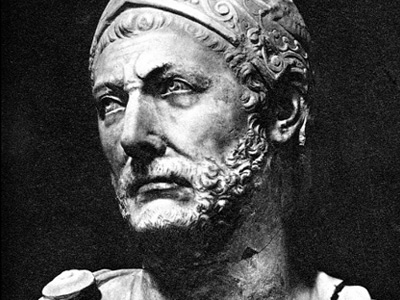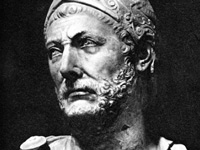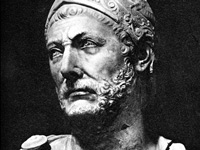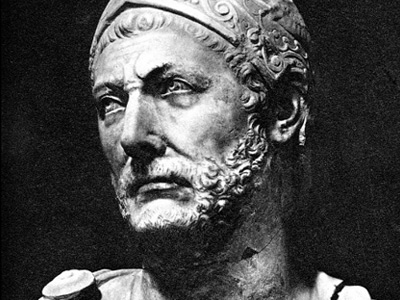Hannibal Barca (247-183 BC)

Later Career
Peacetime Carthage (200–196 BC)
Hannibal was still only 46 at the conclusion of the Second Punic War in 201 BC and soon showed that he could be a statesman as well as a soldier. Following the conclusion of a peace that left Carthage stripped of its formerly mighty empire, Hannibal prepared to take a back seat for a time. However, the blatant corruption of the oligarchy gave Hannibal a chance to re-emerge and he was elected suffete (chief magistrate). The office had become rather insignificant, but Hannibal restored its power and authority. The oligarchy, always jealous of him, had even charged him with having betrayed the interests of his country while in Italy, for neglecting to take Rome when he might have done so. So effectively did Hannibal Hannibal Barca (247-183 BC), was a Carthaginian general, considered one of the greatest military commanders in history. Hannibal lived during a period of great tension in the western Mediterranean Basin, when the Roman Republic established its supremacy over other great powers such as ancient Carthage. One of his most famous achievements was at the outbreak of the Second Punic War, when he marched an army which included war elephants from Iberia over the Pyrenees and the Alps into Italy. Hannibal Barca » reform abuses that the heavy tribute imposed by Rome could be paid by installments without additional and extraordinary taxation. He also reformed the Hundred and Four, stipulating that its membership be chosen by direct election rather than co-option. He also used citizen support to change the term of office in the Hundred and Four from life to a year, with a term limit of two years.
Hannibal Barca (247-183 BC), was a Carthaginian general, considered one of the greatest military commanders in history. Hannibal lived during a period of great tension in the western Mediterranean Basin, when the Roman Republic established its supremacy over other great powers such as ancient Carthage. One of his most famous achievements was at the outbreak of the Second Punic War, when he marched an army which included war elephants from Iberia over the Pyrenees and the Alps into Italy. Hannibal Barca » reform abuses that the heavy tribute imposed by Rome could be paid by installments without additional and extraordinary taxation. He also reformed the Hundred and Four, stipulating that its membership be chosen by direct election rather than co-option. He also used citizen support to change the term of office in the Hundred and Four from life to a year, with a term limit of two years.

These books are available for download with Apple Books on your Mac or iOS device
Exile (after 195 BC)
Seven years after the victory of Zama, the Romans, alarmed by Carthage's renewed prosperity, demanded Hannibal's surrender. Hannibal thereupon went into voluntary exile. He journeyed to Tyre, the mother city of Carthage, and then to Ephesus, where he was honorably received by Antiochus III of Syria, who was preparing for war with Rome. Hannibal soon saw that the king's army was no match for the Romans. He advised equipping a fleet and landing a body of troops in the south of Italy, offering to take command himself. But he could not make much impression on Antiochus, who listened to his courtiers and would not entrust Hannibal with any important office. According to Cicero, while at the court of Antiochus, Hannibal attended a lecture by Phormio, a philosopher, that ranged through many topics. When Phormio finished a discourse on the duties of a general, Hannibal was asked his opinion. He replied, "I have seen during my life many old fools; but this one beats them all." Another story, according to Aulus Gellius, is that when Antiochus III showed off the gigantic and elaborately equipped army he had created to invade Greece to Hannibal, he asked him if they would be enough for the Roman Republic The Roman Republic was a form of government of Rome and the era of the classical Roman civilization when it was run through public representation of the Roman people. Beginning with the overthrow of the Roman Kingdom (traditionally dated to 509 BC) and ending in 27 BC with the establishment of the Roman Empire, Rome's control rapidly expanded during this period - from the city's immediate surroundings to hegemony over the entire Mediterranean world., to which Hannibal replied, "I think all this will be enough, yes, quite enough, for the Romans, even though they are most avaricious." In 191 BC, the Romans under Manius Acilius Glabrio routed Antiochus at the battle of Thermopylae and obliged him to withdraw to Asia. The Romans followed up their success by attacking Antiochus in Anatolia and the Seleucid Empire was decisively defeated at the battle of Magnesia in 190 BC by Lucius Cornelius Scipio Asiaticus.
The Roman Republic was a form of government of Rome and the era of the classical Roman civilization when it was run through public representation of the Roman people. Beginning with the overthrow of the Roman Kingdom (traditionally dated to 509 BC) and ending in 27 BC with the establishment of the Roman Empire, Rome's control rapidly expanded during this period - from the city's immediate surroundings to hegemony over the entire Mediterranean world., to which Hannibal replied, "I think all this will be enough, yes, quite enough, for the Romans, even though they are most avaricious." In 191 BC, the Romans under Manius Acilius Glabrio routed Antiochus at the battle of Thermopylae and obliged him to withdraw to Asia. The Romans followed up their success by attacking Antiochus in Anatolia and the Seleucid Empire was decisively defeated at the battle of Magnesia in 190 BC by Lucius Cornelius Scipio Asiaticus.
In 190 BC, Hannibal was placed in command of a Seleucid fleet but was defeated in the battle of the Eurymedon. According to Strabo and Plutarch, Hannibal also received hospitality at the Armenian royal court of Artaxias I. The authors add an apocryphal story of how Hannibal planned and supervised the building of the new royal capital Artaxata. When Antiochus seemed prepared to surrender him to the Romans, Hannibal fled to Crete, but he soon went back to Anatolia and sought refuge with Prusias I of Bithynia, who was engaged in warfare with Rome's ally, King Eumenes II of Pergamon. Hannibal went on to serve Prusias in this war. During one of the naval victories he gained over Eumenes, Hannibal had large pots filled with venomous snakes thrown onto Eumenes' ships. Hannibal also went on to defeat Eumenes in two other battles on land until the Romans interfered and threatened Bithynia into giving up Hannibal.
Death (183 to 181 BC)
Prusias agreed to give Hannibal up, but the general was determined not to fall into his enemy's hands. The precise year and cause of Hannibal's death are unknown. Pausanias wrote that Hannibal's death occurred after his finger was wounded by his drawn sword while mounting his horse, resulting in a fever and then his death three days later. Juvenal asserts that his death was at Libyssa on the eastern shore of the Sea of Marmara, after having taken poison, which he had long carried about with him in a ring. Before dying, he left behind a letter declaring, "Let us relieve the Romans from the anxiety they have so long experienced, since they think it tries their patience too much to wait for an old man's death".
In his Annales, Titus Pomponius Atticus reports that Hannibal's death occurred in 183 BC, and Livy implies the same. Polybius, who wrote nearest the event, gives 182 BC. Sulpicius Blitho records the death under 181 BC.
HISTORY

RESOURCES
This article uses material from the Wikipedia article "Hannibal Barca (247-183 BC)", which is released under the Creative Commons Attribution-Share-Alike License 3.0.
© Stories Preschool. All Rights Reserved.









